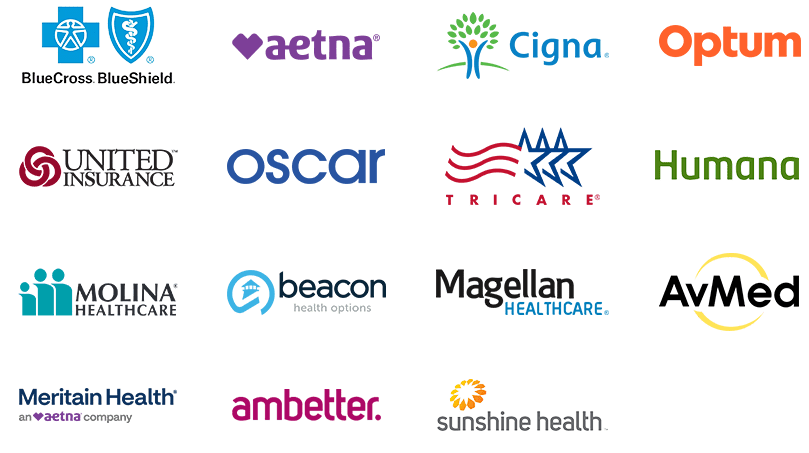Individual Therapy in South Florida
Substance use disorders (SUD), also known as drug addictions, are present in a large population of people across the United States–up to 15% of the population. South Florida also faces concerning rates of substance abuse with 2.5 million people being reported as having an SUD in 2023.
While these numbers are concerning, overcoming addiction in South Florida is possible with clinical and comprehensive addiction treatment. One of the cornerstones of many addiction treatment programs is individual therapy. Individual therapy for addiction gives those who are struggling an opportunity to explore their thoughts, emotions, and behaviors in an effort to achieve self-betterment.
At Principles Recovery Center, individual therapy is used to help address the root causes of addiction while you work toward long-term recovery. Our licensed therapists provide personalized treatment plans that are tailored to meet the specific needs of each individual. Through a combination of evidence-based therapies, such as cognitive-behavioral therapy (CBT) and dialectical behavior therapy (DBT), our clients can gain insight into their addiction and develop healthy coping mechanisms to overcome it.

What is Individual Therapy?
 In individual therapy, clients work one-on-one with a therapist in a safe and confidential environment. This allows for a more personalized approach, as the therapist can focus on the specific needs and concerns of each client. Individual therapy also provides an opportunity for clients in our addiction treatment programs to build a trusting relationship with their therapist, creating a strong foundation for healing and growth.
In individual therapy, clients work one-on-one with a therapist in a safe and confidential environment. This allows for a more personalized approach, as the therapist can focus on the specific needs and concerns of each client. Individual therapy also provides an opportunity for clients in our addiction treatment programs to build a trusting relationship with their therapist, creating a strong foundation for healing and growth.
There are many reasons why a person might want to engage in individual therapy. These reasons may include the following:
- Dealing with Trauma: Individual therapy provides a private space for clients to process traumatic experiences that may be contributing to their substance use disorders.
- Managing Depression and Anxiety: Often, addiction co-occurs with mental health conditions such as depression and anxiety. Therapy helps to treat these underlying issues.
- Improving Self-Esteem: Many who suffer from addiction struggle with low self-esteem. A therapist can assist an individual in rebuilding their self-perception and confidence.
- Enhancing Communication Skills: Therapy can teach clients how to express themselves more effectively and manage interpersonal conflicts.
- Resolving Personal Issues: Whether it’s relationship challenges, work stress, or grief, individual therapy can address a range of personal problems.
- Developing Coping Strategies: Clients learn healthy ways to cope with stress and triggers that might otherwise lead to substance use.
During individual therapy sessions, clients are encouraged to openly discuss their struggles and challenges related to addiction. The therapist will listen attentively, provide support and guidance, and offer tools and techniques for managing difficult emotions and behaviors. By addressing underlying issues that may have led to addiction, individuals can gain a better understanding of themselves and their motivations.
Individual therapy is not a ‘one-size-fits-all’ treatment; it encompasses various modalities designed to cater to the diverse needs and personal circumstances of clients. Different types of individual therapy may include:
- Cognitive-Behavioral Therapy (CBT): Focuses on identifying and altering negative thought patterns that contribute to addictive behaviors.
- Dialectical Behavior Therapy (DBT): Emphasizes the development of skills for mindfulness, emotional regulation, and coping with stress.
- Motivational Interviewing: Helps clients find the motivation to change harmful behaviors through guided conversation and questioning.
- Psychodynamic Therapy: Aims to uncover deep-seated emotional issues from past experiences that may influence current addictive behaviors.
- Humanistic Therapy: Centers on self-exploration, recognizing a person’s freedom to make choices, and the potential for personal growth.
- Experiential Therapy: Utilizes activities and expressive tools to help clients re-experience and express emotions associated with past traumas that may be linked to substance abuse.
- Eye Movement Desensitization and Reprocessing (EMDR): Aims to reduce distress associated with traumatic memories that might contribute to addictive behaviors.
- Interpersonal Therapy (IPT): Addresses interpersonal issues that contribute to substance abuse, such as unresolved grief, conflicts, or social skill deficits.
- Family Systems Therapy: Looks at addiction within the context of family dynamics and relationships that may play a role in substance use patterns.
- Acceptance and Commitment Therapy (ACT): Helps individuals develop acceptance and mindfulness skills to cope with difficult emotions and commit to behavior change.
Choosing the appropriate therapy from these options is an important step in the treatment process. At Principles Recovery Center, we understand that every individual’s path to recovery is unique. Consequently, the types of therapy included in your treatment plan will depend on your specific needs and personal history with substance use.
Our experienced therapists conduct comprehensive assessments to determine which therapeutic methods will be most effective in addressing your challenges and supporting your journey to recovery. This individualized approach ensures that your treatment plan is as unique as your own story, setting the stage for successful and sustainable recovery.
The duration of individual therapy varies widely among clients as it is highly personalized to meet the unique needs of individuals in recovery. There is no one-size-fits-all answer because therapy’s course depends on multiple factors, including the type and severity of the addiction, the presence of co-occurring mental health conditions, the individual’s personal history, and their rate of progress.
Some may find benefit in short-term therapy, which could last for a few sessions, while others engage in long-term therapy that spans months or even years. It is crucial for the therapy to be flexible and readily adaptable to the client’s evolving requirements, ensuring that enough time is afforded to address the complexities of their situation effectively.
The goal of individual therapy is not to set a rigid timeline but to provide a sustainable path toward recovery that allows for as much time as needed to achieve lasting change.
While both individual and group therapy are essential elements of addiction recovery, they serve different purposes. Individual therapy focuses on the individual’s personal growth and healing, while group therapy emphasizes support and connection with others in similar situations. Some key differences between the two include:
- Format: Individual therapy is a one-on-one session between client and therapist, while group therapy involves multiple individuals participating in a session together.
- Focus: Individual therapy delves into personal issues and underlying causes of addiction, while group therapy focuses on creating a supportive environment for sharing experiences and learning from others.
- Personalization: Individual therapy allows for tailored treatment based on the individual’s needs, while group therapy tends to follow a set curriculum or structure.
- Confidentiality: Individual therapy offers a higher level of privacy and confidentiality, while group therapy involves sharing personal experiences with others in the group.
- Social Support: Group therapy provides an opportunity for individuals to give and receive support from others going through similar challenges, while individual therapy focuses on building a strong therapeutic relationship between client and therapist.
Ultimately, both types of therapy can be beneficial in addiction recovery, and often, a combination of individual and group therapy is recommended for the most comprehensive support.
Request a Confidential
Callback 24/7
MEDICAL DETOXIFICATION
IS NECESSARY
It serves as an initial primer for the remainder of the individual’s treatment process. If a patient were to simply skip the detoxification phase of the recovery and go straight into clinical treatment, it’s quite likely that he or she would be experiencing or suffering from withdrawal symptoms and immediately leave treatment and seek comfort in their drug of choice. Although the severity of withdrawal symptoms can vary from one person to the net, the majority of individuals who are suffering from withdrawal would have extreme difficulty participating in treatment even if they stayed. With certain substances like alcohol and benzos posing potentially fatal withdrawal symptoms, detoxification is a must in order to effectively produce the best treatment outcome.
Benefits of Individual Therapy
 Individual therapy offers numerous benefits for those struggling with addiction. It provides a vital platform for personal growth and healing which can help individuals reach and maintain long-term sobriety. Some of these benefits include:
Individual therapy offers numerous benefits for those struggling with addiction. It provides a vital platform for personal growth and healing which can help individuals reach and maintain long-term sobriety. Some of these benefits include:
- Personalized Treatment: Individual therapy allows for a tailored approach to treatment, addressing the unique needs and concerns of each individual.
- Confidentiality: With individual therapy, clients can feel safe and secure knowing that their sessions are confidential.
- Focus on Underlying Issues: By exploring the root causes of addiction, individuals can gain insight and understanding into their behaviors and thought patterns.
- Developing Coping Skills: Through individual therapy, clients can learn healthy coping mechanisms to manage difficult emotions and triggers.
- Building a Trusting Relationship: The one-on-one nature of individual therapy allows for a strong therapeutic bond to form between client and therapist, creating a supportive and healing environment.
By fostering resilience, enhancing self-awareness, and empowering personal responsibility, therapy transcends mere symptom management. It equips clients with a compass to navigate their lives beyond addiction, ensuring that each step taken towards sobriety is grounded in a deeper appreciation for their mental and emotional well-being.
With each session, clients are not only moving away from their struggles but also towards a life of fulfillment and purpose. So, if you or someone you know is struggling with addiction, individual therapy at Principles Recovery Center can be a crucial step toward a brighter future.
How Individual Therapy Helps in Addiction Recovery
Through individual therapy, clients can gain a better understanding of their emotions, thoughts, and behaviors, helping them to identify triggers and develop coping mechanisms.
Therapists provide practical tools and techniques that clients can use to manage difficult emotions and situations without turning to substances.
Individual therapy allows for the exploration of underlying issues that may contribute to addiction, such as trauma, mental health conditions, or relationship problems.
With individual therapy, each client receives tailored treatment based on their specific needs and circumstances, ensuring a more effective approach.
By developing better communication skills and learning to manage conflicts, individuals can improve their relationships with loved ones.
Individual therapy equips clients with the tools and strategies necessary for maintaining sobriety and preventing relapse in the long run.
Individual therapy plays a crucial role in addiction recovery by addressing the underlying issues that contribute to substance use. It provides individuals with a safe space to explore their thoughts and emotions, gain insight into their behaviors, and develop healthy coping skills. Additionally, through individual therapy, clients can work on improving their self-esteem and developing a positive mindset.
Individual therapy is also beneficial in relapse prevention. By addressing underlying issues and developing coping skills, individuals can better manage triggers and stressful situations that may lead to relapse. Furthermore, the strong therapeutic relationship formed during individual therapy provides ongoing support and encouragement during the recovery journey.
Addiction Treatment in Davie, Florida
 In our recovery programs at Principles Recovery Center, individual therapy serves as a cornerstone treatment approach. For instance, in our outpatient addiction treatment program, clients can engage in one-on-one therapy sessions while maintaining their daily life commitments. This modality allows flexibility and continuity of care as clients apply the therapeutic insights and skills they’ve acquired in real-world settings, which is invaluable for their recovery journey.
In our recovery programs at Principles Recovery Center, individual therapy serves as a cornerstone treatment approach. For instance, in our outpatient addiction treatment program, clients can engage in one-on-one therapy sessions while maintaining their daily life commitments. This modality allows flexibility and continuity of care as clients apply the therapeutic insights and skills they’ve acquired in real-world settings, which is invaluable for their recovery journey.
Equally integral is individual therapy in our dual diagnosis treatment, which recognizes the intricate link between substance use disorders and mental health concerns. Here, individual therapy takes a comprehensive approach, with therapists specializing in both addiction and mental health to address the complexities of dual diagnosis. Our other programs include:
- Partial Hospitalization Program (PHP)
- Alumni Program
- Espanol Program
- Adolescent & Teen Addiction Treatment Program
This tailored therapy is vitally important as it treats the whole person, ensuring that no aspect of the client’s well-being is neglected. Our individual therapy adapts to the nuances of each client’s experience, whether they are navigating addiction in outpatient treatment or confronting the challenges of a dual diagnosis.

WE’VE GOT
YOU COVERED!
Insurance coverage for treatment is within reach. We are in-network with most insurance carriers in South Florida.

Individual Therapy at Principles Recovery Center
What sets Principles Recovery Center apart is our dedication to not just the treatment of addiction but the holistic restoration of the individual. We understand that addiction is often a symptom of deeper emotional or psychological issues, and our approach aims to resolve these underlying concerns.
For those ready to embark on a journey toward lasting recovery, we invite you to reach out to us at Principles Recovery Center. By choosing us, you’re not just accessing individual therapy; you’re joining a community dedicated to empowering you to create a life free from addiction. Contact us today to learn more about our individual therapy and how we can personalize a treatment plan that paves the way to your wellness and fulfillment.
CREDENTIAL HIGHLIGHTS



